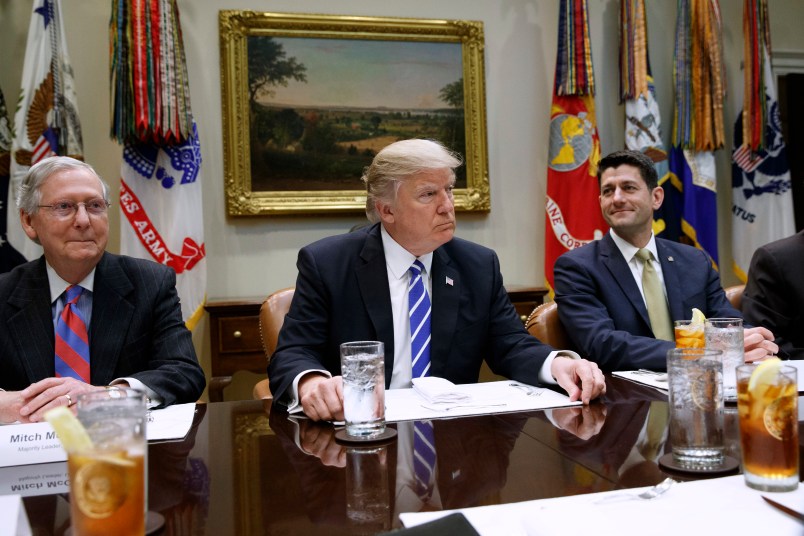Even though Republicans now control the White House and both chambers of Congress, that doesn’t mean they will have an easy time agreeing on and implementing a plan to fund the government going forward.
Though we are still a couple weeks away from seeing the actual text of the President’s budget blueprint, many controversial pieces of the plan have been revealed, including a $54 billion hike in military spending, and deep cuts to the State Department, the Environmental Projection Agency and the Coast Guard, among other departments and agencies.
Already, signs of revolt are emerging on Capitol Hill, and top budget experts warn of an array of legal and political obstacles standing in Trump’s way.
Here are 5 points to keep in mind as the budget battle unfolds:
We could be headed for another government shutdown.
In 2011, Congress passed the Budget Control Act, which set strict spending caps on both the military and domestic agencies, the dreaded sequestration. Under that law, it would be illegal for Congress to boost spending on the former by making cuts to the latter.
“You have two pots of money and you can’t exchange between the two,” Stan Collender, a former top staffer on the House and Senate budget committees, told TPM.
That means Trump would have to convince 60 members of the Senate to vote to raise the cap just on the military side. Democrats will in all likelihood present a united opposition front, and such a bill can’t pass without them. Several Republican lawmakers have admitted that this gambit is impossible.
“I don’t think you’ll get 60 votes to just lift it on defense only,” Lindsey Graham (R-SC) told TPM on Wednesday.

The 2013 government shutdown over Obamacare
So what’s a tried-and-true way to get lawmakers to vote for something they hate? Attach it to a must-pass bill to keep the government running or to raise the debt ceiling. Such an opportunity is coming up in late April, when Congress either has to pass a continuing resolution to continue funding the government or risk another federal shutdown. They’ll get another bite at the apple this summer, as Congress must vote to raise the debt ceiling by August or September or risk a national default.
“I definitely think we’re headed for another clash and possibly a shutdown,” said Bill Hoagland, who worked for decades for the Senate Budget Committee. “I don’t think we’ll default on our debt. We never have before, and they must know it would be a black mark on Republicans if we did.”
Trump’s other options involve breaking the law.
Faced with that daunting 60-vote threshold, the administration may be forced to explore other options. According to Collender, “the only options are outside the law or questionable.”
“This is an administration that has been signaling that they won’t let the law stop them from doing what they want to do,” he said. “They’ll look for extra-legal ways to get it done.”
One of those extra-legal options would be ordering the Office of Management and Budget to simply ignore the Budget Control Act. Another would be to put the $54 billion in new defense spending in the Overseas Contingency Operations (OCO) fund—the pot of money for the nation’s active wars in Iraq and Afghanistan that is not subject to budget caps. If the money is then not used for those wars, this would violate the law.
Trump’s newly confirmed budget director Mick Mulvaney was adamantly opposed to the Pentagon using OCO to get around budget limits when he was a member of Congress, but he may have had a change of heart since joining the Trump administration.
Trump is targeting popular programs that Republican lawmakers want to protect.
To get anywhere close to the $54 billion in cuts to non-defense discretionary spending needed to fund a similar-size increase for the Pentagon, Trump would need to cut about 10 percent of every single federal program and agency, outside of the entitlement programs Trump has vowed not to touch.
The cuts, explained Hoagland, would target the areas that have already been the hardest hit over the past five years. “There has already been nearly a 14 percent decrease in non-defense discretionary spending since 2011,” he said. “To go even further would involve severely cutting things like NASA, the Small Business Administration, Amtrak, the Job Corps, Head Start, and Pell Grants. Cutting things like that I call ‘eating your seed corn.’ It would really hamper economic growth.”
Usually ones to cheer cuts to federal funding, some Republicans have become so troubled that particular programs are on the chopping block that they are already speaking out against Trump’s plans.

Rep. Mike Simpson (R-ID) told reporters this week that he’s concerned the plan to cut a full quarter of the EPA’s budget would have a devastating impact on the ground. “Much of what they do is state and local grants for clean water and clear air and that kind of stuff,” he said. “I don’t know if you want to cut that.”
Congressional opposition is even stronger when it comes to the State Department, which Trump has proposed cutting by more than a third.
Senate Majority Leader Mitch McConnell (R-KY) bluntly told reporters that a budget with such cuts could “probably not” pass the Senate. Sen. Lindsey Graham (R-SC) blasted the proposal, telling TPM that cutting funding for diplomatic envoys, global health initiatives and other State Department programs “makes us less safe, puts our diplomats at risk, and destroys soft power. You need soft power to win the war.”
Simpson said many of his Republican colleagues, even those remaining silent for the time being, will stand up against the cuts when the time comes to debate and vote on the budget. “There is more to our government than just defense,” he added. “Congress will make their voice known on this. The middle-of-the-road people want to see government work.”
Budget experts like Collender, however, are skeptical that Trump will listen to the lawmakers’ concerns. He predicts that instead of a collaborative process, Trump will push forward with his plan and attack any Republicans who stand in the way. “I’m not sure the Trump administration cares much about the Republican caucus on the Hill, and would just as soon throw them under the bus to get what it wants,” he said.
It’s impossible to analyze the budget while we’re still in the dark on taxes, infrastructure, and health care.
The Trump administration is moving full steam ahead with this budget before lawmakers have clear guidance on plans to radically overhaul the tax code, spend an additional trillion dollars on infrastructure, and repeal the Affordable Care Act. Each one of these plan could have a huge impact on how much money is available to spend, yet they’re being discussed separately from the budget itself.
This, says Joel Friedman with the Center for Budget and Policy Priorities, makes no sense. “You need to pull all these pieces together to look at the totality of what they’re doing,” he said. “The problematic thing is that the budget we’re going to see doesn’t pull all those things together. They’re only focusing on the appropriations part, which isn’t the full story.”
Despite boasts from Republicans earlier this week that the plan to repeal and replace Obamacare will rapidly move forward very soon, deep divisions and uncertainties remain. GOP leaders are currently keeping their draft plan under lock and key in the basement of the Capitol, barring Democrats and most Republicans from reading it. They also plan to push for a vote before the Congressional Budget Office has an opportunity to crunch the numbers and announce what the bill would cost and how many people would lose or gain insurance.
The CBO’s analysis of the 2015 Obamacare repeal bill, which conservatives on Capitol Hill say they want to emulate this time around, found that it would increase the federal budget deficit by $137 billion over a decade.
Without knowing the economic forecast this time around, lawmakers may have a hard time voting to approve either a massive spending cut or a large increase.

The ghost of Ronald Reagan.
Budget experts say the country has not seen anything remotely like Trump’s plan for decades, and the most recent historical analogue is the first budget of President Ronald Reagan, which similarly slashed domestic social programs to fund a gargantuan increase in military spending.
As you may remember, that didn’t work out so well.
The deficit soared, government spending and the number of federal workers increased despite Reagan’s promises to bring them down, shuttered federal programs had to be reopened, and number of people living in poverty shot up.
“Reagan found that his budget went too far too fast and increased the deficit by too much,” said Collender. “He had to backtrack. He signed four tax increases after that.”
Collender worries that if he found himself in a similar situation, Trump may not be willing to take the steps Reagan took to contain the damage. “I don’t think Trump is the same kind of president as Reagan. He’s not as experienced in government, and I don’t think he feels the same level of responsibility,” he said. “I think he is more willing to break the china.”







Ice tea with lemon?
We’re paying taxes to provide these clowns with ice tea and lemon?
Remind you of anything?

What is trump budgeting for his weekend sleepovers in FL?
The EPA and Bureau of Land Management are easy targets when you are out of power. Now that the GOP reps actually have the power to nix clean water and tourism spaces for their constituents, it’s suddenly harder to pull the trigger.
Bullies are gutless punks, period.
I think everybody realizes that Trump is exactly the sort of person who will break the China, goaded On by The Steve bannon’s of the world.
Reagan was regarded as genuinely a radical at the time, but don’t forget that he needed to balance budgets in California, in other words he indeed had experience with this stuff - no matter how radical right his inclinations may have tugged at his heartstrings. Congress will not give unstable, untrustworthy Trump any Rope 2 hang us all and their own 2018 chancesl